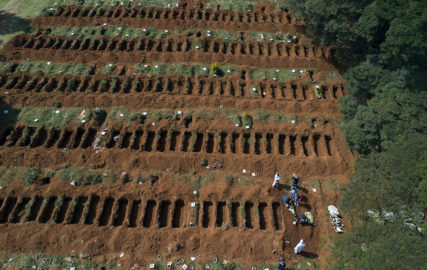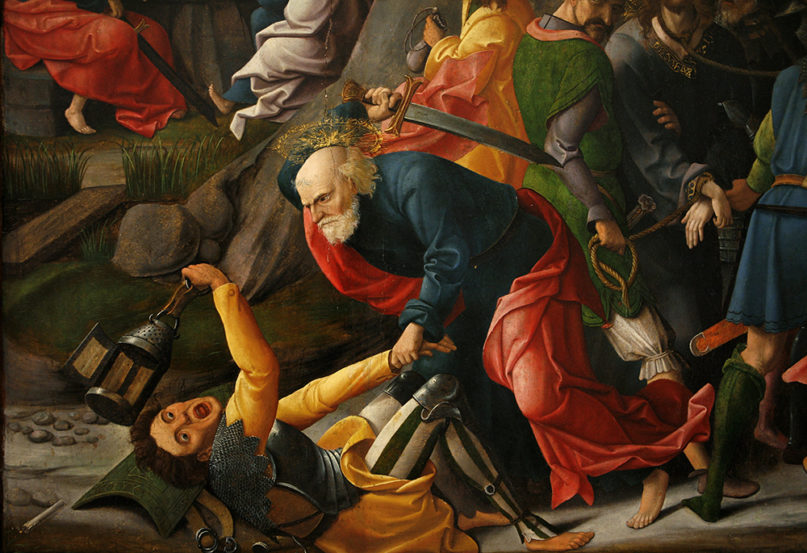(RNS) — This weekend my husband and I dialed in to our Episcopal church’s Holy Week services. We participated in Evening Prayer over Google Meets on Maundy Thursday, with almost as many parishioners as we used to see in the pews; on Easter Sunday, we did the same thing for Morning Prayer.
But it was the remote experience of Friday’s service — the Good Friday liturgy — that struck me most. The absence of the Eucharist, as is customary for Good Friday, rendered the strangeness of the digital form only natural — a liturgy that is about alienation, death and loss experienced through our shared physical absence.
As our readers read aloud the story of the Passion in the Gospel of John — 30 minutes or so in which we had no music, nor incense, nor any of the aesthetically rich liturgical accidents in which I often find it all too easy to lose myself — there was nothing for us to do but listen to the words, unvarnished, of the story being told.
In listening in this way, I found myself noticing new elements of John’s account of Jesus’ suffering and death — moments to which I’d never before paid full attention. Most Christians will recall when the high priest and his men arrive in the Garden of Gethsemane to arrest Jesus, setting into motion the chain of events that will culminate with Christ’s Passion and Resurrection. The disciple Peter is furious. He falls upon the High Priest’s servant, strikes him down and cuts off his ear.
But it’s the line that comes next that struck me. The servant gets a name. The Gospel writer tells us, in an oddly specific aside: “The servant’s name was Malchus.” Later on, we learn that Malchus has a relative: another servant of the high priest, who later identifies Peter as a disciple of Jesus.

Cemetery workers in protective clothing bury a person at the Vila Formosa cemetery in Sao Paulo, Brazil, on April 1, 2020. Vila Formosa cemetery, the largest in Latin America, has had a 30% increase in the number of burials amid the spread of the new coronavirus, according to the cemetery’s administration. (AP Photo/Andre Penner)
The motif of the nameless underlings who get killed or maimed while our heroes fight the Big Bad is a common one — in ancient mythology and pop culture alike. “Star Trek” fans even coined a name for these unfortunate instances of collateral damage: redshirts, named for the disposable, anonymous crew members, clad in red Federation uniform tops, who often ended up dead on that show. Functionaries rather than commanders, they don’t get their own stories, their own histories, their own names. They don’t get relatives to care for them, to mourn their death or injury.
But the Gospel writer feels compelled to mention not just that one of Jesus’ disciples has maimed a man who is just doing his job but also to give us that man’s name, a glimpse of that man’s family. Occurring as it does shortly before Peter’s infamous threefold denial of Jesus, the incident also gives us a glimpse into Peter’s spiritual struggles: He is a man who, in struggling to work out what it means to be a disciple of Christ, in falling short in his own faith, forgets the individuality, the humanity, of the man he maims in anger.
In this strange and surreal coronatide, it has become uncannily easy to look at human beings as numbers. A day in which 800 people die in New York is a “good” day, by the standards of the news cycle, because new hospitalization rates are flattening, because fewer people are being put on ventilators, because we are getting ever closer to flattening the curve. Lives, deaths, names are submerged into statistics.
The crisis of disembodiment we all face, as we socially distance, is also a crisis of particularity: We are at once more conscious of the effects our bodies have on the bodies of others, and yet those others are even more cognitively distant from us. We will never know the names of the people whom we might have saved by staying home; we will never know the names, too, of the sick, the dying, their families, the doctors and nurses who tend to them.
Our experience of remote church — itself surreal — here felt not only an acceptable way to commemorate Good Friday, but even a fitting one.
Displaced from the physical presence of church, from corporeal fellowship, we were asked to turn our attention outward: not just to other people, in a vague sense, but to one another, other full, real, named human beings, our fellow parishioners, each named and intermittently pictured on our screens; all the people we come across in our newly narrow lives; and the people whom we will never come across but to whom we are nevertheless indebted — whose names we will never learn.






